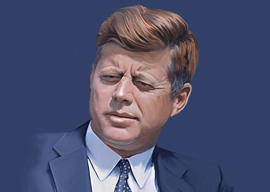
December 05, 2012

John F. Kennedy
But that wasn”t a popular realization, so everybody who was anybody mostly ignored Lee Harvey Oswald and went on acting as if it had been Strom Thurmond up in the Texas Book Depository with the mail-order rifle.
President Johnson announced his Great Society in May 1964 and signed the Civil Rights Act in July. The era’s first black riot followed a couple of weeks later. LBJ won by a landslide in November, and vast riots ensued in Watts in 1965 and Detroit in 1967. Rates of homicide and illegitimacy turned upward, too.
What caused African Americans in the 1960s to respond to their historic triumphs with looting and mugging?
The usual explanations don”t seem to work. The economy was booming throughout these years. The Vietnam War was becoming a disaster in 1965, but it’s not clear that Americans yet much noticed. For example, the first major battle, in the Ia Drang Valley (depicted in the Mel Gibson movie We Were Soldiers), was not fought until months after the Watts Riot.
The more I’ve dwelled on the timeline, the more it seems that the black liberation of the first half of the 60s was greeted in the decade’s second half by something like the Victory Riots that follow sports championships. Since roughly the Detroit Pistons” NBA championship in 1990, we’ve become familiar with the phenomenon of a Victory Riot, in which a team’s fans run amok.
There has been an occasional Defeat Riot, such as in Vancouver last year after the Canucks lost the Stanley Cup, but it is usually a product of high expectations.
Similarly, black riots protesting police abuse don”t happen when the cops have the upper hand. They tend to occur in liberal times and places: not George Wallace’s Montgomery, but Pat Brown’s Watts or George Romney’s Detroit. There were three lethal riots in 1980s Miami during the Cuban takeover, all triggered by incidents involving Hispanic policemen. The Rodney King conflagration in Los Angeles followed a year of the media vilifying the LAPD.
Victory Riots are similar to the orgies of pillage and rape that conquering armies notoriously engaged in after a long siege of a city.
Much the same applies to street crime. As the feminists have argued, rape is a peculiarly political offense.
Note the role that black-on-white rape played in the rise of white feminism. Susan Brownmiller, author of the influential book Against Our Will, sensibly explained to People in 1975 that she had started out with the misconceptions
of anyone growing up in the liberal New York City milieu. To me, rape was a screaming vindictive white woman and a framed black man….But there is a definite rise in the percentage of interracial rape….I think writers like Eldridge Cleaver and Franz Fanon, who tried to give rape an ideological justification, didn’t help. They tried to justify interracial rape as some sort of political act. It’s typical of the left to make a convicted rapist a hero.
There were similar outbreaks of rape following black liberations in South Africa in the 1990s and in the American South during Reconstruction. See Gone With the Wind and The Birth of a Nation for what Americans remembered of life in the defeated South. The events aren”t all that different from Nobel Laureate J. M. Coetzee’s 1999 novel Disgrace about the gang rape of an Afrikaner professor’s lesbian daughter. In war, the victors rape the losers” women.
Image of JFK courtesy of Shutterstock